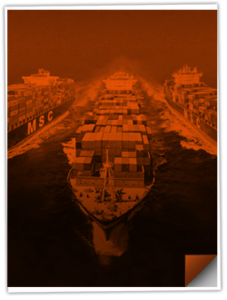Featured Headlines:
Don’t Do the Charleston, Do the Hustle!
Taking Inventory on Inventories
It's a Duty-Free…Philosophy…the MTB Reform Act
A Not-So-Delightful Turkish Delight
To Consignee or Not to Consignee, that is the Question
An Agricultural Export RAPP-Up
Don’t Do the Charleston, Do the Hustle!
- A software glitch recently caused a two-day shutdown at South Carolina Ports, with both ocean-side and hinterland facilities affected, temporarily disrupting the flow of international cargo in the region.
- Not since 1923, the year The Charleston dance craze began, have we seen so much toe-tapping in beautiful Charleston!
- Almost immediately, 16 vessels lined up in a row, desperate for their number to be called to the unloading dance floor. Vessel waiting time is up to 8 days.
- Speaking of toe tapping, “the toe wall” infrastructure project already has the essential Wando Welch terminal operating at 67%, so Charleston couldn’t afford to be off-beat or out-of-synch even for a dance step or two. Why is that? Great question!
- Remember the good ol’ Leatherman Terminal, the one that was to greatly expand Charleston’s capacity? Well, now we move from toe-tapping to stepping on toes!
- Local ILA stevedores took issue with Leatherman’s non-union plans and sued. The Supreme Court did not say that the union could not do that, which we’re pretty sure means they can sue.
- Thus, Leatherman is under-utilized just as Wando “paints its’ toes” (or whatever a toe wall really is or does or affects… or something)!
- Even the ever-charming Charleston couldn’t prevent this technology hiccup, and the equally charming Savannah is setting up her harbor as a parking lot as steamship lines shift rotations to avoid or at least delay arrivals to Charleston.
- We thought it would be a hurricane or two to shift SC Ports from doing the Charleston to doing The Hustle, but the maritime folks will surely be doing both for the next six weeks or so. “Do the Hustle! Do it!” Did you worldly readers know those are ALL the lyrics to that famous and infamous song??!! Doot do doo da doo doo doo do do!
Have Your Rupees at the Ready
- CMA and Hapag-Lloyd are hitting customers with a $500 peak season surcharge for the US East and Gulf coasts from India. And Hapag-Lloyd isn’t stopping there; they also decided to tack on an additional $1,000 for US West Coast shipments. Wait, there’s more!
- Never one to stand on the sidelines, MSC joined in on the fun by introducing a $1,200 increase for West Coast and Canada-bound cargo–how generous of them!
- Maersk’s peak season surcharges are a slightly more modest $560 per 20-foot container, $600 for a 40-foot, and $760 for a 45-foot, respectively.
- Despite the overall rise in prices, industry insiders doubt that carriers will succeed with rate hikes on the India-US East Coast route due to excess capacity.
- However, the West Coast is a different story, as bookings are bursting at the seams, making the chances of a rate hikes much more likely—though maybe not at full asking price.
- Unlike the turbulent transpacific, rates from India to Europe have remained steady through May, though carriers are battling schedule disruptions.
Taking Inventory on Inventories
- US shippers, wholesalers, and retailers might be feeling hopeful about the consumer economy, but they’re certainly playing it cool with inventory levels.
- The BlueGrace Logistics Confidence Index reveals a steady rise in negative feelings about inventory levels through Q3 2024. And nearly a quarter of shippers (21%) are feeling down about their stockpiles, up from just 8% in Q1.
- Positive vibes about inventory growth have also dipped to 41% from 51%.
- Given the current atmosphere, shippers are leaning towards keeping inventories tight. BlueGrace’s Jason Lockard suggests this “no-build-and-hold” approach indicates that customers are keeping their biggest cost center under tight control to avoid overstocking.
- Following a similar suit, supply chain research from S&P Global shows that 19% of companies are on the fence about their inventory strategies—the highest level of uncertainty since early 2020.
- Despite the cautious inventory approach, freight demand for Q3 is expected to stay steady. And although nearly two-thirds of trucking carriers reported lower volumes in Q1, a hopeful 33% expect demand to rise in the next three to six months.
It's a Duty-Free…Philosophy…the MTB Reform Act
- There’s nothing like a good Lion King reference to help break-up the workday, am I right? Shoutout to all those dedicated Shapiro subscribers moonlighting as die-hard Disney fans (we know you’re out there)!
- Now that we’ve properly “Hakuna Matata’ed,” let’s get to the real headline…
- Two dozen members of the House of Representatives have introduced legislation that would reinstate the Miscellaneous Tariff Bill (MTB). Here are a few of the main points of the proposed MTB Reform Act:
- Retroactively applies to shipments between January 1, 2021 and December 31, 2025.
- Excludes Chinese originating goods subject to Section 301 tariffs from eligibility unless there was a tariff exclusion in place prior to December 31, 2020.
- Provides two more legislative cycles under current procedures (in 2025 and 2028).
- For more details about this announcement, please refer to H.R. 8398 (IH) – Miscellaneous Tariff Bill Reform Act.
A Not-So-Delightful Turkish Delight
- The Turkish government recently announced that it will suspend all exports and imports to and from Israel until the Israeli government allows for the uninterrupted and sufficient flow of humanitarian aid into Gaza.
- As such, officials have issued an advisory reminding that, with respect all US-based commercial activities, the Export Administration Regulations (EAR) prohibit the use of certain actions by all US citizens—regardless of their physical location at present—in furtherance or support of an unsanctioned foreign boycott maintained by a given country against a US-friendly country; and require such persons to report any boycott-related request to the Department of Commerce’s (DOC) Bureau of Industry and Security (BIS).
- US companies operating in Turkey are cautioned to be on high alert for any requests to refrain from importing and/or exporting goods to or from Israel, and to be prepared to provide certification indicating that certain goods are not of Israeli origin and/or do not contain Israeli-originating components or materials.
- Examples of recent boycott request reports can be found on the Office of Antiboycott Compliance’s (OAC) website.
- For further information, please contact OAC officials directly at 202-482-2381 or via the online inquiry form.
To Consignee or Not to Consignee, that is the Question
- US Customs and Border Protection (CBP) issued a reminder to importers regarding their obligations for completing origin documents.
- The announcement was prompted after CBP officials have seen a sharp increase in the use of consignee information instead of the required importer information; specifically when the consignee is not the importer of record (IOR).
- The following origin documents must include the IOR details:
- Origin declarations; and
- Origin statements or certificates of origin.
- Questions related to this advisory can be directed to the Office of Trade, Trade Agreement Branch via FTA@cbp.dhs.gov.
- To read the full notice, please refer to CSMS # 60588866.
Amazon…More Like Ama-GONE
- Once the reigning champion of fast deliveries, Amazon is now facing stiff competition from Walmart, Temu, and Shein—forcing the retail giant to rethink its corporate strategy.
- The growing pressure from competitors has pushed Amazon to aggressively expand its warehouse space, adding over 16 million square feet (sq ft) in 2024 in North America alone. This brings its total footprint to a staggering 413 million sq ft.
- To keep up with the demand for faster deliveries, Amazon plans to double its same-day fulfillment centers, while also adding larger distribution facilities ranging from 600,000 to one million sq ft.
- Amazon is also shifting from a centralized network to a regional structure with nine autonomous regions. This aims to bring storage closer to product markets, speeding up deliveries and reducing transport costs.
- Thanks to Walmart’s 4,600+ stores, it managed to outpace Amazon after clocking in a reported 4.4 billion same-day or next-day deliveries over the past year. But its success isn’t limited to the US—Walmart’s same-day orders in India jumped 150%, and one-hour deliveries in China hit 55 million (!).
- Meanwhile, Amazon is stuck in Timbuk-“two,”, as it dukes out a full-blown price war with Walmart and Target after both rivals slashed prices on thousands of items.
An Agricultural Export RAPP-Up
- Agriculture Secretary Tom Vilsack announced the new Regional Agricultural Promotion Program (RAPP), a $300 million initiative for 66 organizations in the US aimed at boosting American food and farm exports in high-potential global markets.
- Launched in October 2023, RAPP uses $1.2 billion from the Commodity Credit Corporation to help US exporters expand beyond traditional markets and into regions with growing demand—such as Africa, Latin America, and Southeast Asia.
- RAPP funding supports various projects, including the US Meat Export Federation’s $21 million plan to expand in the ASEAN region and Africa, and the US Dairy Export Council’s $10 million initiative to navigate dairy regulations in Africa.
- Vilsack emphasized that expanding into these diverse markets will make domestic producers more competitive and resilient in the global trading environment, thereby helping to reverse the decline of small and mid-sized farms in America.
- For a complete list of organizations receiving financial support from RAPP, visit the US Department of Agriculture’s (USDA) Fiscal Year 2024 RAPP Funding Allocations page.
Rail Food Felons
- The container thefts throughout the pandemic at the Ports of Los Angeles and Long Beach (LA/LB) have now spread across the entire US, unearthing sophisticated criminal networks within the supply chain along the way—a surprising number of which are food-related.
- Johnsonville, a Wisconsin-based sausage company, reported that six of its last 300 shipments experienced cargo theft related activity. Despite thieves stealing a relatively small percentage of total cargo, the breaches have increased insurance claims by 300% over the last five years.
- Many break-ins occurred near Chicago rather than Southern California as anticipated. Thanks to handy dandy remote temperature sensors on containers, officials were able to detect these incidents, though it highlights the widespread nature of the problem.
- One shipment of soybeans from Fargo, North Dakota (ND) shipping through Minneapolis to the Pacific Northwest arrived in Asia with only ONE FOURTH of its original load intact.
- In an effort to combat these rail food felons, Union Pacific (UP) has ramped up security with an additional 62 surveillance cameras and 10-foot-high concrete walls topped with razor wire along the most vulnerable tracks. However, despite these efforts, criminal activity is still spreading across UP’s 32,000-mile network.
- The problem is exacerbated by the ability to sell stolen goods on third-party platforms. UP has warned consumers to be wary of deeply discounted items online, as this may be an indication of stolen merchandise.



